Harold Brian "Vic" Coxen was born on October 21, 1911 in Bude, Cornwall. His paternal grandparents were Irish Catholics, whilst his mother was a Protestant. He was a War Substantive Major (officially Captain) with the 1st and 4th Parachute Battalions in the Second World War.
Before the war, Vic, who was over 6 foot tall, played football for Plymouth Argyle as an amateur during a season in which they were promoted to the second division. He also played rugby and cricket and was a respected athlete. He worked for the National Provincial Bank alongside his duties for the Territorial Regiment of the Duke of Cornwall's Light Infantry (DCLI).
Vic was commissioned into the DCLI in 1938 as a Lieutenant before the formation of the Parachute Regiment. It was with this unit that he fought in Belgium and France in the early stages of the war, where they lost more than half of their strength. Eventually forced to return home, Vic made his way to Le Havre to be evacuated.
For the following two years, Vic was back in the United Kingdom preparing for Operation Torch. He completed his parachute jump training from 8 to 16 June 1942 on course 15 where he is listed as "Lt. Cosen". This was a refreshingly easy course owing to the "very favourable" weather and "good condition" of the ground. As the course organiser states: "the progress made was excellent and the results in which there were only 2 injuries in 760 descents indicates the high standard that was achieved". Vic was posted to the 1st Parachute Battalion on completion of his training, becoming a Captain by 21 October 1942 (backdated from 1 November 1947). It was around this time that he also earned the added seniority of becoming a war substantive Major (first mentioned in the Gazette of June 1943).
The 1st Parachute Battalion arrived off the coast of Algeria by boat on 12 November 1942. They then marched towards an airfield known as Maison Blanche but, failing to reach it before sunset, they bivouacked in a large park which was not exactly as it seemed. As Vic himself described:
"I saw over my head a huge bunch of bananas. I remember saying to myself this is not so bad. I can stand this sort of country. I think they were the only bunch of bananas that grew in North Africa. We had been billeted in the botanical gardens".
From Maison Blanche, the Battalion flew to Tunisia where they dropped in over Souk El Arba Airfield on 16 November. This jump went smoothly overall apart from an unfortunate Private Webster who drifted into some power lines and died. At this point, the Battalion were 400 miles east of where the Army was forming up in Algiers and they had been dropped in to support the army's advance. Vic was in T Company, where he was second-in-command to a man named Jack Bull and had control of 2 platoons.
Vic was full of praise for his men, stating "because we had the ability to vet every soldier coming in to the Battalion....every private soldier would've [otherwise] been a corporal in an ordinary line regiment". Of the Germans, he said "they were well trained to the degree that you could almost say how they would react because they worked by the book". However, the Battalion also faced difficulties. For instance, they could never find ammunition for their Colt revolvers to the extent that "we turned to captured Schmeisser submachine guns[...] rather than using our own". Meanwhile, "it took a little time to build up the airfields with a sufficient radius of action" to overcome the Germans in the air. Nevertheless, Vic maintained that the 2nd Battalion "had rather more casualties than we did in the early stages...because the 1st Battalion were in the hills where the tanks could not traverse".
Whilst the British paratroopers "kept away from townships and towns because they were an obvious target" they "found that the Arab would tell you where the German was and he would tell the German where you were". And, as Vic explained, "if you had a fight they would loot the dead [...] they didn't like either of us[...] because we were interfering with their lives".
It was with the 1st Battalion in North Africa that Vic would earn his two wartime citations. The first was the Military Cross, awarded 23 September 1943 for his actions at Djebel Mansour in January and February:
"On the night 30/31st January, 1943, Captain Coxen was in command of a strong fighting patrol which attacked enemy positions in area Djebel Mansour (Tunisia: sheet 41. 0.7092). Although met by intense machine gun fire he skilfully overcame enemy positions and captured four prisoners and inflicted heavy casualties on the enemy, and destroyed two mortars and many machine guns. He then withdrew his men in face of a strong counter-attack with the loss of only one officer. Captain Coxen returned alone to the enemy positions without regard to his own safety to search for this officer.
On the night 2/3rd February, 1943, the Battalion attacked the same feature and in the early stages of the attack Captain Coxen's Company Commander [Jack Bull] and all other Company officers were either killed or wounded. Captain Coxen by his leadership and personal example rallied the Company, and personally attacked the machine gun positions which were holding up the advance. During the subsequent action on the feature Captain Coxen's coolness and courage was an inspiration to all under his command"
Vic subsequently received the Distinguished Service Order, awarded 15 September 1943, for his actions in March of that year:
"On the 28th March 1943 in the Djebel Abiod Sector (Tunisia Sheet 10) the Battalion attacked strong enemy positions. Major Coxen was in command of the leading company which had to attack a strongly held enemy position on a hill. Although the attack was met by intense machine gun fire Major Coxen rallied his men and led them into the assault. It was due to the gallantry and leadership of Major Coxen that the feature was taken. Later in the day Major Coxen's company had to attack a superior German force in a wood. Major Coxen personally led a bayonet charge against the enemy which failed to dislodge them from their positions but inflicted heavy casualties on them. He then withdrew his company, reformed them and charged again, this time capturing the enemy positions and some fifty prisoners. Major Coxen's personal leadership so inspired his men that very strong enemy opposition was overcome. The courage and leadership of this officer during all previous actions have been of the very highest order."
After the Germans surrendered in Northern Tunisia in May 1943, Vic was part of Operation Husky and parachuted into Sicily in July 1943 with the 1st Bn to secure the Primosole bridge for advancing seaborne troops. At this time, he was commander of R Company, and stated that he "commanded all 3 [1st Bn.] companies at various times". Of the advance to the Primosole bridge, he recalled that "we were the first company down...of course in actual fact we didn't get there". He continues:
"We were going over the coast near the Primosole [estuary]...I had with me 2 men who were going to bring the Rebecca Eureka devices to guide the gliders in...I could see the Primosole river and the bend of it in the moonlight...suddenly the aircraft bent over and went out to sea again...we [were] ten minutes early....I said well that doesn't matter a bugger...so they turned right back...suddenly the aircraft bent over sideways and climbed...everybody went arse over applecart. I went out on my hands and knees. Nearly all of the people in my stick got out except the last 3...and they were wrapped up with the seats; didn't get out [they survived]". Vic later discovered that the pilot "suddenly saw he got a bloody hill in front of him".
After the drop, he recalls: "My soldier landed below me and broke his leg; too quick. I was lucky". He and his men then made their way to the bridge through the hills: "I ran into a German siege battery, coastal battery. I had 40 Italian prisoners...we captured their things and spiked their gun, blew it up a bit. I wanted to leave them frankly, they were a bloody nuisance". By the time they reached the Primosole bridge, it had already been captured.
Meanwhile, the 4th Parachute Battalion was part of a predominantly American group that was sent to attack the Italian mainland. They boarded HMS Sirius and landed at Taranto on September 9, rapidly taking up positions north west of the town. Unfortunately, a few days after the landing, the CO of the 4th Bn, Lieutenant Colonel Dene, was captured. Major S.H. Blakie was called upon for a brief interim as commander but a replacement was needed.
After fighting through Sicily, Vic spent a very brief spell as the 2nd in command of the 3rd Parachute Battalion. But Vic - who was now a temporary Major - was then appointed Commander of the 4th Parachute Battalion (to formally replace Dene). Reverend E.N. Downing ("Holy Joe"), a padre in the 4th Battalion, stated that the transition was not easy at first:
"It was in the village of Cassamassima, and I had done my little talk and invited questions, when I noticed some nodding and nudging going on, and finally "Titch", a tiny man, cheeky, and a wonderful soldier, piped up, "D'you know, Sir, I don't think the new C.O.'s very interested in this Battalion". I was appalled, but of course must not, and I hope did not, show it. After a few seconds, each of which seemed like an age, I said, "Well, Col. Coxen doesn't believe in working quite in the way Col. Dene did. Col. Dene used to give his weekly pep-talk, and kept going round looking at what everyone was doing, day after day, and swearing pretty hard some of the time. Col. Coxen believes in just saying what he wants, and leaving everyone to get on with it without interference. Give him time, and I think you'll find he's alright." And it was not so very long before they were worshipping the ground he trod on."
He joined up with them on the far side of Taranto after it had been captured. He and his men then "came up through the mountains" to join the ongoing American sealanding invasion of Salerno. Marching north through Italy, the Battalion crossed the Sangro on December 4 and onwards to Rome in the new year. On June 23, the Battalion moved to Monte Mario north of Rome where they prepared for the invasion of France. During the summer, the "attendance of the Bn at a Papal Audience in the Vatican" was recorded. Vic recalled this event:
"The whole of my battalion went to see the Pope...I had lots and lots of Irish in my battalion...they marched by him....there was such a crush....I had turned round to expostulate a bit and I went past the Pope backwards!
Now the CO of the 4th Parachute Battalion, Vic helped to spearhead the invasion of southern France in Operation Dragoon, August 1944. He and many other paratroopers dropped very wide of their intended DZ, with Vic himself 25 miles adrift of where he should have been. Nevertheless he managed to link up with the rest of command the following morning.
Vic was part of the parachuting force dropped into Greece in October 1944 amid high winds at Megara airfield. Initially tasked with driving out the Germans, the battalion was rapidly wrapped up in a domestic power struggle against Communist rebels.
After the war, Vic rejoined the National Provincial Bank but promptly rejoined the Parachute Regiment when he realised it was no longer for him. He was back in command of the 4th/6th Parachute Bn from January 1947 with the goal of maintaining a tenuous peace in Palestine. He was promoted to Major on 21 October 1947. Following this he rejoined the DCLI as second in command in Mogadishu. In 1949 he returned to Greece as chief instructor at the Greek School of Infantry. He was placed in charge of the school of Land-Air Warfare from 1951. On 1 July 1952, he again advanced another rank to the title of Brevet Lieutenant Colonel, becoming a full Lieutenant Colonel on 25 December 1954. In 1956, Vic was assigned to command the 2nd Parachute Battalion in the Suez Canal Zone, returning home afterwards to command the Parachute Regimental Depot. He became a regimental Colonel on 4 September 1957. A posting order dated 31 January 1957 informed Vic that he was to be a temporary Brigadier in command of 160 Infantry Brigade (TA) from 17 October 1957. His final post before he retired was as a garrison commander in South Wales in 1961.
Vic was married in 1938 to Kathleen Vera Davison. They had three daughters and a son.
He died in August 2000, aged 88.
Compiled with information from:
Pegasus Archive, Mark Hickman
Obituary (Telegraph)
IWM Oral History: Coxen, Harold Brian (1995) cat number: 15100
Tunisian Tales, Niall Cherry
The London Gazette
Airborne Assault Archives (1st Para Bn Citations, 2 D3 29.2.3)
Padre with the Para, by "Joe" (The Revd E.N. Downing)
Article written by Alex Walker
Read More
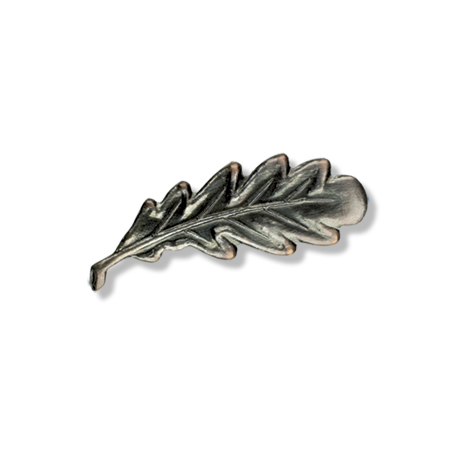

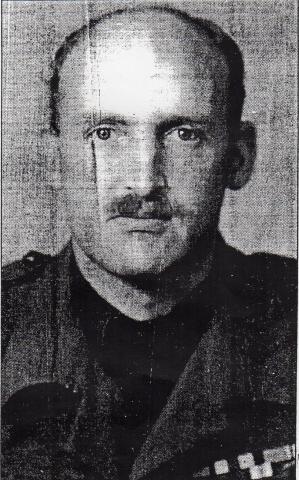
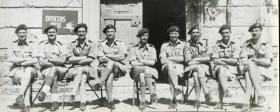
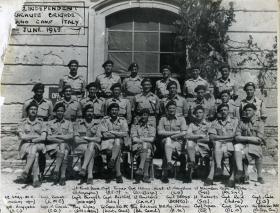
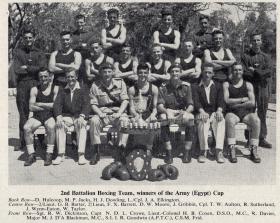
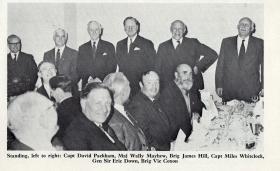
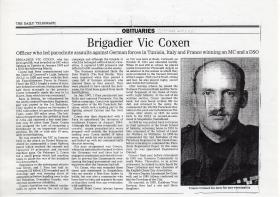
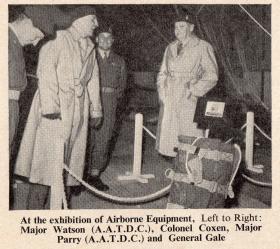
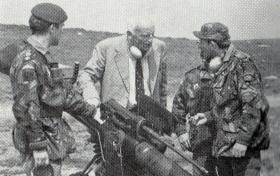
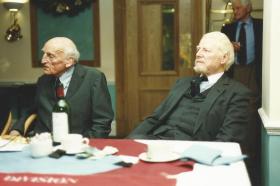
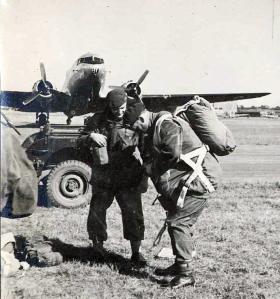
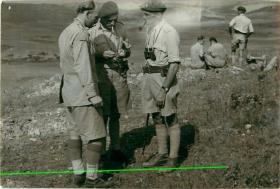
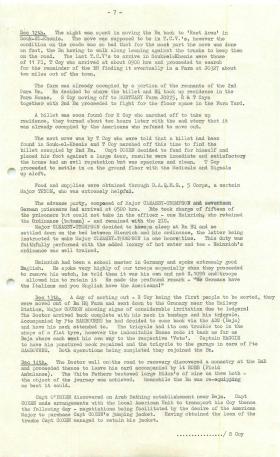
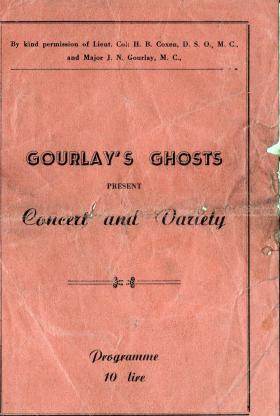
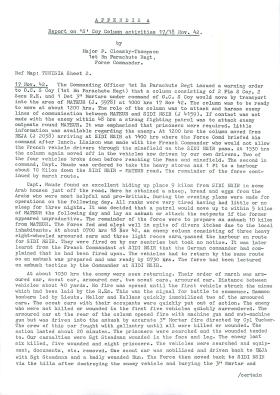
Latest Comments
There are currently no comments for this content.
Add Comment
In order to add comments you must be registered with ParaData.
If you are currently a ParaData member please login.
If you are not currently a ParaData member but wish to get involved please register.